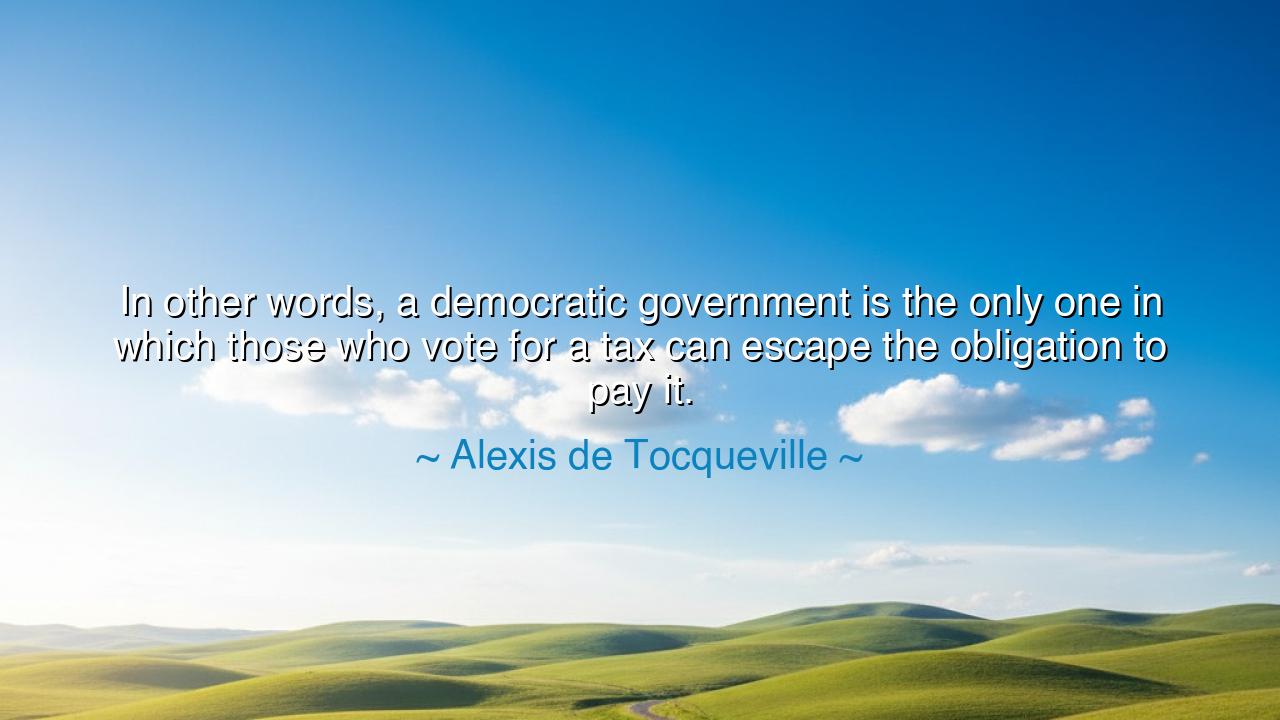
In other words, a democratic government is the only one in which
In other words, a democratic government is the only one in which those who vote for a tax can escape the obligation to pay it.






In the quiet majesty of the nineteenth century, when the young republic of America was still a wonder to the old empires of Europe, the philosopher and observer Alexis de Tocqueville looked upon its people and saw both its glory and its peril. From his reflections came these immortal words:
"In other words, a democratic government is the only one in which those who vote for a tax can escape the obligation to pay it."
Beneath this seemingly simple sentence lies a truth deep and troubling — a warning wrapped in wit, a mirror held up to the soul of democracy. Tocqueville, in his great work Democracy in America, admired the energy, equality, and spirit of self-governance that he saw in the New World. Yet he was no blind admirer. He saw, too, that the seeds of decay were hidden in the very soil of liberty. For in democracy, the many may rule over the few, and when that power is used without wisdom or restraint, it becomes not justice, but tyranny by numbers.
The meaning of Tocqueville’s quote shines through the ages: in a democracy, those who hold the power to vote — the citizens — may impose burdens upon others that they themselves do not bear. When voters approve taxes that fall chiefly on others — the rich, the merchants, the landowners, or any group deemed “privileged” — they act as rulers, not equals. The essence of democracy, which is shared responsibility, becomes corrupted into the pursuit of advantage. Thus, democracy risks devouring itself, for when one part of the people discovers it can enrich itself at the expense of another, the bond of unity dissolves, and the public spirit dies.
Tocqueville wrote these words not as a cynic, but as a prophet who saw too clearly the frailty of human nature. He knew that liberty, once gained, must be guarded not merely by laws, but by virtue — the moral discipline to restrain one’s own desires for the common good. In France, where monarchy had fallen and republics had risen and died, he had seen how the masses, weary of hardship, would gladly support taxes and decrees that punished the wealthy or the powerful — not out of justice, but out of envy. Yet soon, those same burdens fell upon all, and the people found themselves chained by the very laws they had cheered. Thus, Tocqueville’s wisdom is a call to beware the temptation of selfish democracy, where the people, in their might, forget that they too must obey what they create.
There is an echo of this truth in the story of ancient Athens, the cradle of democracy itself. In its golden age, when orators like Pericles stirred the assembly, the citizens grew accustomed to voting for great public works — temples, theaters, fleets — funded by taxes levied upon the rich. For a time, it seemed noble: the poor gained bread and spectacle, the city flourished. But as generations passed, the burden grew heavier, the virtue weaker. The wealthy fled or hid their fortunes; the people grew dependent on state gifts. In the end, Athens fell not by the sword of Sparta alone, but by the decay of its own civic spirit — by the belief that one could vote for wealth without earning it.
Tocqueville’s insight, then, is not an argument against democracy, but a plea for its maturity. He reminds us that freedom demands responsibility, and equality demands fairness. To rule in a democracy is to bear the same weight one places upon others. When the citizen forgets this — when he demands from the treasury what he has not contributed, or burdens others with taxes he will not pay — he becomes both tyrant and victim. For in the end, it is not the taxed few who perish, but the nation itself, hollowed from within by greed disguised as justice.
The lesson of this quote burns brighter in our time than ever before. The people must learn once more that government has no wealth of its own — it holds only what the people give it. When we vote, we must not ask, “What will this give me?” but, “What will this require of us all?” True democracy is not the art of taking from others, but the discipline of giving together. It thrives not on envy or entitlement, but on shared sacrifice and mutual trust.
So take heed, O children of liberty: beware the sweetness of benefits you have not earned, and the comfort of burdens you have not borne. For every tax unjustly levied, every favor selfishly granted, every policy that divides giver from taker — all are cracks in the foundation of freedom. Let every voter remember that to govern is to serve, and to vote is to vow responsibility.
Thus ends the teaching: a democracy that taxes without conscience enslaves itself. The just citizen gives as he votes — not for gain, but for the good of all.






AAdministratorAdministrator
Welcome, honored guests. Please leave a comment, we will respond soon